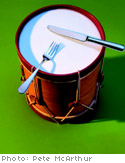Dieting to a Different Drummer

Sometimes just seeing the word diet can make us reach for the potato chips. But simply by shifting your mental focus away from food, weight loss can happen without the usual pattern of obsession and backsliding. Experts explain the curious phenomenon of the diet-free diet.
Break Old HabitsAccording to Ben Fletcher, PhD, a psychologist at the University of Hertfordshire in England, people who push themselves out of their daily routine can better re-examine basic choices about food and exercise. Fletcher gave a group of 55 overweight men and women 15 pairs of contrasting behaviors (i.e., proactive/reactive, introvert/extrovert), then asked them to act out a different one each day. (The challenge arose when withdrawn types had to be outgoing, or when people who normally take the bull by the horns had to sit back and just watch.) Twice a week, they also had to explore novel activities like tuning in to a different radio station or trying a new brand of coffee. When Fletcher checked up on his subjects four months later, they had lost an average of 11 pounds each—without so much as breathing the dreaded D word. After a year, most had kept the weight off and some had lost 40 pounds or more.
Watch Your Language
In a new book, Think Thin, Be Thin: 101 Psychological Ways to Lose Weight, psychotherapist Doris Wild Helmering says that changing how you talk can change how you eat. "People who have a good self-image do better on diets because they believe they can," she says. Start by dropping verbal self-abuse—if you wouldn't call a friend a "big fat slob," you shouldn't refer to yourself that way. Use present-tense verbs to boost yourself into a new zone: Maybe you used to be too lazy to exercise, but not anymore. Eliminate weasel words like planning and hoping when you tell others about your goals, and you'll subconsciously reinforce the possibility of success. (You're not trying to eat healthier, you're doing it.) Even body language counts. Straighten your shoulders, raise your chin, walk tall, and you'll be prepared for change.
Eat to the Beat
What you hear can influence how much you eat (a fact restaurant owners use to promote customer turnover). In the 1980s, Ronald Milliman, PhD, a marketing professor at Western Kentucky University in Bowling Green, found that brisk songs (92 or more beats a minute) caused diners to eat 20 percent faster than when they listened to slower music (72 or fewer beats a minute)—U2 versus Enya, for instance. The connection isn't as surprising as you might think, says psychoacoustic specialist Joshua Leeds, who studies how sound affects the nervous system. "All the major body pulses—your heart rate, breath, brain waves—will speed up or slow down to match an external periodic rhythm." Eating too quickly gives your body less time to register that you're full, so trade the mealtime rockfest for Brahms or Norah Jones. You may not even notice that your fork is working half-time.



